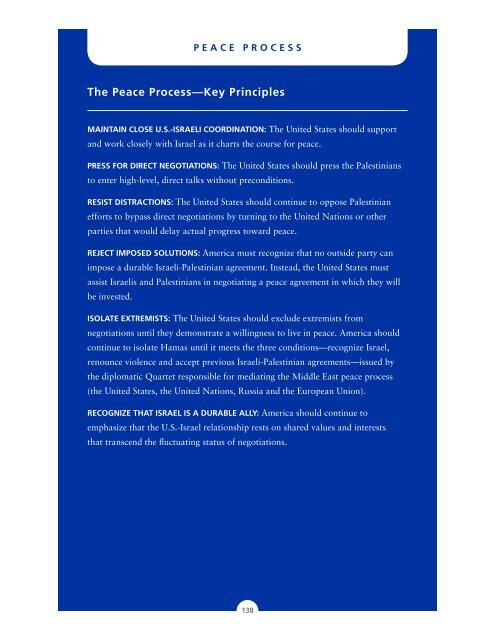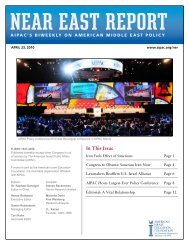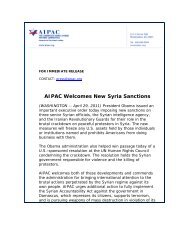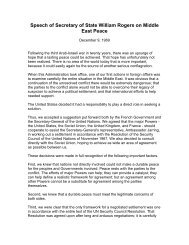2013 Briefing Book - Print Version - Aipac
2013 Briefing Book - Print Version - Aipac
2013 Briefing Book - Print Version - Aipac
You also want an ePaper? Increase the reach of your titles
YUMPU automatically turns print PDFs into web optimized ePapers that Google loves.
PEACE PROCESS<br />
The Peace Process—Key Principles<br />
MAINTAIN CLOSE U.S.-ISRAELI COORDINATION: The United States should support<br />
and work closely with Israel as it charts the course for peace.<br />
PRESS FOR DIRECT NEGOTIATIONS: The United States should press the Palestinians<br />
to enter high-level, direct talks without preconditions.<br />
RESIST DISTRACTIONS: The United States should continue to oppose Palestinian<br />
efforts to bypass direct negotiations by turning to the United Nations or other<br />
parties that would delay actual progress toward peace.<br />
REJECT IMPOSED SOLUTIONS: America must recognize that no outside party can<br />
impose a durable Israeli-Palestinian agreement. Instead, the United States must<br />
assist Israelis and Palestinians in negotiating a peace agreement in which they will<br />
be invested.<br />
ISOLATE EXTREMISTS: The United States should exclude extremists from<br />
negotiations until they demonstrate a willingness to live in peace. America should<br />
continue to isolate Hamas until it meets the three conditions—recognize Israel,<br />
renounce violence and accept previous Israeli-Palestinian agreements—issued by<br />
the diplomatic Quartet responsible for mediating the Middle East peace process<br />
(the United States, the United Nations, Russia and the European Union).<br />
RECOGNIZE THAT ISRAEL IS A DURABLE ALLY: America should continue to<br />
emphasize that the U.S.-Israel relationship rests on shared values and interests<br />
that transcend the fluctuating status of negotiations.<br />
138








